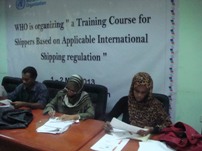 The transport of infectious substances is strictly regulated. Training contributes to improving compliance with applicable regulations ensuring protection of staff, the public and the environment2 May 2013 | Khartoum – The Federal Ministry of Health of Sudan and WHO organized a two-day training course on the shipping of infectious substances for 21 laboratory technicians from different parts of the country who might have the responsibility for shipping infectious substances.
The transport of infectious substances is strictly regulated. Training contributes to improving compliance with applicable regulations ensuring protection of staff, the public and the environment2 May 2013 | Khartoum – The Federal Ministry of Health of Sudan and WHO organized a two-day training course on the shipping of infectious substances for 21 laboratory technicians from different parts of the country who might have the responsibility for shipping infectious substances.
In the past, Sudan has faced several epidemic threats requiring infectious substances to be sent to various WHO collaborating centres for laboratory analysis and characterization. Samples from the last November's yellow fever outbreak in Darfur were shipped to Institut Pasteur in Dakar, Senegal, while suspected Guinea-worm cases were analysed at the Centers for Disease Control and Prevention (CDC) in Atlanta.
The workshop focused on the importance of ensuring appropriate shipping of infectious substances and covered various modules: introduction to transport of infectious substances; shipping terms; categorization; packaging; marking and labelling; documentation; and refrigeration.
Facilitated by WHO’s global influenza surveillance and response system, the course is recognized by the air transport authority International Civil Aviation Organization (ICAO) and the International Air Transport Association (IATA). At the end of the course, participants were required to take the practical and written test in order to receive the Infectious Substances Shipping Training (ISST) certificate that meets international transport regulations standards and is valid for two years.
Since 2007, 25 ISST workshops have been held worldwide, training 570 laboratory technicians globally. The training was designed by the WHO programme which supports capacity development for implementation of the International Health Regulations (IHR 2005).
Related links
Infectious Substances Shipping Training: a course for shippers
A guide for shippers of infectious substances, 2013
International Health Regulations



